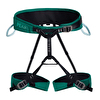Reinhold Messner interview

 1 / 4
1 / 4 Planetmountain.com
Planetmountain.com
"I want to be remembered as the alpinist who failed more than anyone else on the 8000m peaks." If you have an idea about who Reinhold Messner is, based on an image of him portrayed (thanks also to himself) by magazines, books and television, then change it. The words which filled the bare room at Castel Firmiano, seat of the biggest of the five museums founded by the South Tyrolean mountaineer, are those of a 65 year old who grew up with his own beliefs but who also never steered shy of facts or those who corrected him. Were one to remember Messner as simply the first to climb all fourteen 8000m peaks then that would certainly not do him justice: before setting foot in the Himalaya, his mountaineering feats in the Alps and Dolomites were sensational and thisHimalayan period was then followed by traverses in the Antarctic, in Greenland, a solo journey through the Gobi desert, a stint as member of the European Parliament, and now the adventure of his mountain museums. Certainly though Messner owes his fame to the Himalayan giants, a fame which no other mountaineer had never experienced before and will perhaps never experience again. So let's start from here.
How do you deal with the honour and responsibility of being the world's most famous alpinist?
"Notoriety doesn't necessarily equate to an alpinist's quality. But it's true, I'm famous because I also do other things beyond the mountaineering world. I'm a public figure which attracts attention. Having said that, I'm interested above all in leading my own life, without necessarily wanting to be a leader, not wanting to satisfy the desires of someone in particular or the public in general. I don't want to be followed."
So you never felt the burden of this responsibility?
"No. We're not responsible towards those who use as as their role model. I'm not responsible for those who want, but are not capable of."
Alpinists are pictured as being free, or rather, individualistic. Have you ever felt your freedom to be limited by this?
"My freedom as an alpinist includes the responsibility I have for everything I do which is connected to those dear to me, children, wife, parents. It's clear that those who do dangerous activities have this responsibility and only those who accept this can really claim to be free mountaineers. Mountaineering is carried out in and archaic world devoid of rules, but it's exactly for this reason that there is hardly a cure for a mistake. It's an anarchical life which forces alpinists to accept responsibility for their actions. Every difficult ascent requires that one contemplates the possibility of death, and in this sense alpinism is a selfish act."
But have you never felt limited by the fact that you are a famous individual?
"I'm a public figure and this is a burden; but I accept it because I know that it doesn't condition my choices. I don't care who applauds or boos me. I want to be judged on stage as a speaker; on a literary plain if I write a book, on an artistic level if I make a film. But not like a calf with three heads because I climbed all fourteen 8000m peaks or Everest or other such things."
When you climbed your last eightthousander you wrote: I'm pleased I did it, but I'm not proud. Can you explain why?
"I was one of the first who put an end to heroic alpinism which had sprung to life during the first decades of the last century in Italy and Germany - not by chance cradles of European fascism - which not only survived after the Second World War but is still alive, in part, even today. I was the first to say: I'm not going to wave any flags from the summit, my handkerchief if my flag. I was criticised and insulted for this. I also don't share the philosophy according to which an alpinist who dies in the mountains is some sort of hero. No, if an alpinist dies, then it's nothing less than a tragedy. And the only thing one can do is look after those left behind."
With regard to your 8000m ascents, you wrote that at a certain point in time your motivation to continue your collection ebbed. What had happened?
"I felt that challenges and possibilities had gone missing. I started high altitude mountaineering at the end of the so-called era of conquest, and my generation and that of Bonington therefore attempted to climb those same mountains via difficult routes or virgin faces. Our aim was yes to reach the highest summit, but with a minimum of gear and, if possible, via a difficult route. It's a sort of alpinism which I developed one step after the next. In the beginning (in 1970 on Nanga Parbat) I opted for a difficult route with a traditional-style expedition. This was followed (in 1975 on Gasherbrum I) by a difficult route with just one partner (Editor's note: Peter Habler); in 1978 I soloed Nanga Parbat and then, that same year and with Peter Habler, I climbed Everest without supplementary oxygen. This was followed in 1980 by my solo ascent of Everest. Four years later came the traverse of the two Gasherbrum (Editor's note: together with Hans Kammerlander). At this point, all that was left was the entire collection of all 8000m peaks, but this wasn't what I'd originally set out to do. What is certainly true is that, having reached that point and after having climbed three 8000ers in a year - also due to the stimulus of young alpinists who followed my ascents and who counted on me - I thought that I may as well climb them all."
The crisis set in on the last mountain, Lhotse, in 1986. Did this fear stem from being so close to realising your aim, or was this due to something else?
"It was clear to me that by finishing off the 8000ers I'd free myself of a burden I'd placed on myself. But in truth I already had other ideas. On Lhotse, on the extremely exposed summit ridge, the wind was so strong that it risked blowing us off the mountain. But my partner Kammerlander insisted: let's continue, and that's what we did. It turned out to be a liberation but also a moment of crisis: for 16 years I hadn't done anything else - and I had always done everything, from logistics to the search for sponsorship. My partners didn't share my future projects of crossing to the Poles and I didn't find anyone ready to follow me; perhaps they didn't comprehend the size of that new adventure, or perhaps they feared it. I had to learn from scratch and fortunately I encountered specialists in that field and got to know extraordinary new companions."
Was this perhaps due to lack of media attention? Perhaps the Himalayan giants are more famous than the Poles?
"For a long time exactly the opposite held true: the real competition lay in reaching the Poles, this was far more prestigious than the 8000ers. Things then changed in the '50's: the British had invested money and lost men in the race to become the first to reach the Poles, but were beaten both at the both the North Pole and South Pole. So they turned their attention to Everest and invented the "third Pole". Immediately after the conquest of Everest the 8000ers lost a great deal of their attraction, but since every important mountaineering nation wanted its own 8000er, their fame grew again and continues strong even today. Unfortunately few people have understood the value of these great Arctic and Antarctic crossings, because they are distant, those who write about them do so in cold and technical terms, emotionless, without having the courage to bare their souls."
Can commercial activities condition the choice of alpine objectives, or even force alpinists to dare more than is licit?
"Licit doesn't exist. Everyone is free to take all the risks they want to and I never judge the decisions of others. Having said that, it's true that sponsoriship pushes cutting-edge alpinism to attempt certain climbs. Naturally those who invest money are interested in visibility, but an alpinist must know how to chose his own objectives and resist possible outside pressure."
You know what it means to fail. How does one come out from an experience such as this, what does one learn?
"No cutting-edge mountaineer has never failed. You learn through failure, not by what we believe are victories. To be fully aware it's important to know your personal limits and you only get to know these by experimenting. I've failed on thirteen 8000ers. I want to be remembered as the alpinist who failed more than anyone else on the 8000m peaks. I climbed 8000ers 18 times, because I was interested in the climbs, not in records. Had I not failed (as happened on Dhaulagiri, Makalu and Lhotse) then I'd be long dead. I proved to that I can take on courageous challenges, but also that I know how to turn back."
In your book "Mein Leben am Limit" you wrote "when you're up there, you'd be willing to do everything it takes to save someone." Nevertheless, mountaineering chronicles are littered with episodes of narrow-mindedness or meanness which at times cost the lives of other alpinists. In experiences like these, at the very limit of existence, does man regress or show himself for what he really is?
"Uuntil an alpinist climbs with just one or two friends, he'll do everything it takes to save his companion. But if there are thousands of other people on a route, this behaviour will separate him from the thousands of others. This is the same difference as the one between a mountain culture which obliges, due to the harsh or extreme climate, sharing and solidarity, and a metropolitan culture, where individuals live alone, albeit amassed together. How often have you read about people found dead in their homes without others having ever noticed anything? How many passer-bys stop to ask if someone sitting on the pavement needs help? The urban culture, competitive and individualistic, has now reared its head in the mountains, conditioning alpinism, too. I was at Everest Base Camp in 2003 and you needed two hours to get from the first to the last tent. I asked for two friends I knew were there and no one knew who they were, despite the fact that they were all climbing the same route."
During the ascent of your first 8000m peak, Nanga Parbat in 1970, you lost your brother Günther. How and how much did this episode mutate your relationship with alpinism in general?
"It was a fundamental experience in my life and it made me believe that camaraderie in the mountains is completely dead. I knew, as I reached the summit, that we were heading towards an absolute risk. Then, during the descent, there were no other choices. It was an extreme blow for my parent; for me, furthermore, there was the dismay of people not believing me. The expedition leader thought I was dead and when I returned he had to provide and explanation to himself and the others. My return destabilised his plans because he believed it impossible that we could descend Nanga Parbat in those conditions. This was followed by accusations, and only the finding of the remains of Günther, 35 years later, provided the truth, despite all the unworthy speculation fabricated against me."
After the first flight in space, Yuri Gagarin stated that he had not seen God up there. What did you see on the peaks of the highest mountains in the world?
"Those who believe that Everest lies closer to God are mistaken. If we think of the infinite, then there is no difference between Everest and ourselves, here at this modest altitude. The Afterlife, or God if you want to call it, is beyond us. I respect the Afterlife, but I don't have the right nor the courage to describe it, it's simply beyond us."
You once wrote that real adventure is when you cannot guarantee that you'll return alive. What value does Reinhold Messner give to life itself?
"It's not that life is worth less if you put it on the line or expose it to the risk of losing it. Going to dangerous places is a way of living more intensely. Besides, living in a metropolis is far more dangerous than the summit of Everest. We've spent thousands of years protecting ourselves, but the feeling of insecurity stops us from growing."
How do you judge you experience as a member of the European Parliament?
"It was positive, even if I realised that it wasn't for me. I learnt something really important: that Europe is necessary more than ever before. Defending local interests in Europe is a mistake. Europe is at the forefront of ecology, social themes and peace. It's the card we can play for the rest of the world."
In Mein Leben am Limit" you also wrote "happiness has never created me problems". This expression is as beautiful as it is obscure. Can you explain it
"A happiness obtained is something boring. As are knowledge and already having things. The path to happiness is far more interesting; planning and searching for it."
You stem from a background which was cohesive, with strong values and a community spirit which you interpreted as closed and reactionary. You opted to leave this and went out into the world, chose the mountains as a sport. Are your museums now a return to this smaller world, or something which has come a full circle?
"I was lucky enough to leave this land which was and still is a very closed environment. I returned there with my idea of peace and I want to suggest practical ways of living together. I was the first to say: we South Tyroleans are neither Italians nor Austrians nor Germans, but South Tyroleans and Europeans. If we think like this we'll soon be an example for the other regions in Europe. If you said this some time ago you'd have been expelled from the community. Only now, slowly, my line of thinking, that of Alex Langer, has proved to be the right one. I got three mountain farms going again proving that a local, authentic economy can work, that it doesn't necessarily need external finances to be self-sufficient and an example for others. This is what I intend as politics."
Interview by Erminio Ferrari and Ellade Ossola - 12/09/2009
| Links Planetmountain | |
| News Reinhold Messner | |
| Video | |
| Reinhold Messner - TrentoFilmfestival 2009 | |
| Nanga Parbat - Trailer | |



 Copia link
Copia link
























